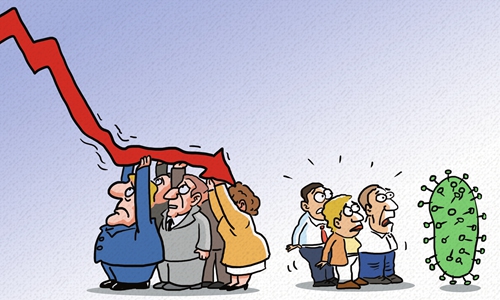HOME >> OPINION
Washington’s handling of coronavirus demonstrates political flaws, healthcare woes
Source:Global Times Published: 2020/3/4 17:53:40

Illustration: Liu Rui/GT
A genetic analysis of the novel coronavirus in the US state of Washington suggested that the "illness could have been spreading within the community for as long as six weeks before the first case was detected," according to the New York Times Monday. The US Centers for Disease Control and Prevention (CDC) hasn't respond to this claim, but such confusing information is a reflection of flaws in the prevention and control measures the US authorities have adopted so far.The US has reported at least 120 cases and nine deaths from the novel coronavirus as of press time. But the US government's attitude toward the virus is beyond anticipations. Washington has been focusing more on minimizing the influence of the virus on stock market confidence and its impact on the economy.
The US CDC appears not to have been prepared for the outbreak of the virus. Take the testing and identification of cases. The CDC set strict criteria on who can be given the nucleic acid test. The 15th confirmed case of the virus in the US, the first likely case of community spread in the country, was left undiagnosed for days. "Since the patient did not fit the existing CDC criteria for COVID-19, a test was not immediately administered," according to media reports. The CDC's policy and its flawed response, isolation measures, and allocation of materials for epidemic prevention, have sparked controversy on US social media.
The US is also not doing as well as it claims in terms of information transparency. For example, a patient in Washington State - a teenager with mild symptoms - was unaware that he was being tested for the coronavirus because he went to a clinic on February 24 to be tested for the flu, the New York Times reported on Sunday.
The CDC said 472 tests had been conducted as of Sunday, but the "total tested" figure was removed from the CDC's website on Monday. The number of cases has begun to surge as more people are tested for the virus. This shows the US authorities have done little to contain the spread of the virus, which could be much more severe than what has been officially announced. The extent of the spread of the virus is still not known.
The US government's strategy at the moment is to control information, transparency and freedom of speech, of which it is so proud. The White House has directed health officials and scientists to coordinate all statements and public appearances with the office of Vice President Mike Pence, the New York Times reported. Pence has been chosen by President Donald Trump to oversee issues related to the novel coronavirus epidemic in the US.
The US does have a mechanism to respond to a public health emergency like the COVID-19, but the US government has taken the virus for granted. US policymakers are giving the economy priority, and believe that Americans should endure the emergency on their own. But it seems that they don't care if ordinary people can make it through the crisis. This is the scenario the US is showing to the world.
According to CDC data on the current flu season, at least 32 million people have fallen ill from the flu in the US, with 310,000 hospitalizations and 18,000 deaths from the common flu. Some Americans, including Trump himself, are comparing the COVID-19 death toll to the seasonal flu in an attempt to downplay the threat of the coronavirus. "This is not Ebola. It's not SARS, it's not MERS. It's not a death sentence," Mick Mulvaney, the acting White House chief of staff, said on February 26.
The US government and relevant authorities are not psychologically prepared for the epidemic. From the perspective of US current epidemic prevention operations, they have actually messed it up, but won't admit to it. Trump even misidentified the gender of the first US fatality during a press conference on the US response to the coronavirus.
This was a reflection of bureaucracy within the US government, which is not ready to face an emergency like the outbreak of the COVID-19. Hence, the insufficient parts of such a mechanism are revealed in the confusion of contradictory official statements, delayed announcements and a lack of transparency.
The article was compiled by Global Times reporter Xu Hailin based on an interview with Shen Yi, director of the Research Center for Cyberspace Governance of Fudan University. opinion@globaltimes.com.cn
Posted in: VIEWPOINT